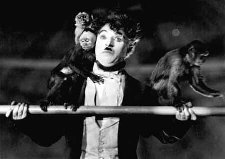The Circus

Coming as it did between Chaplin’s almost-legendary bookends The Gold Rush and City Lights, The Circus was for many years maligned as one of Chaplin’s back-burner numbers. But while it has no big agenda to burnish, The Circus is the kind of movie that would be a masterpiece in the career of any other silent-movie comedian, and it’s not exactly chopped liver on Chaplin’s resume either.
Before the main plot even gets underway, there’s a superb opening sequence involving Charlie, a cop, and a pickpocket (Steve Murphy, recognizable in face and character as a variation on the conman he played so smoothly in Buster Keaton’s short Cops [1922]). This entire segment could have played by itself as a short subject, and at first it seems almost a pity that the melodramatic plot has to be squeezed in.
The story is that a very unsuccessful circus has come to town. It’s run by a tyrannical ringmaster (Allan Garcia) who regularly abuses his daughter the circus walker (Merna Kennedy). Charlie happens into this non-laugh-fest while escaping from the cop, and he makes such a mess of the show that the audience, thinking he’s part of the act, laughs and applauds him wildly.
The ringmaster has Charlie audition for the show, but since Charlie didn’t know he was being funny, his attempts at being deliberately humorous fall flat – although with this circus, who can tell? The ringmaster has Charlie watch a couple of the circus’ comic routines and then orders Charlie to imitate them. That seems a strange request, since these routines are the same ones that aren’t getting any laughs, and Charlie’s innocent bollixing-up of them plays better than the straight routines do.
Charlie gets turned down for the job (he tells Merna that he and the ringmaster “couldn’t come to terms”), but then he gets hired as a prop man at the last minute, and he’s the laugh hit of the show once again. Only Charlie himself doesn’t realize this, and the ringmaster does his best to keep the news under wraps. When Merna finally lets Charlie in on the secret, he’s able to finagle a better salary for himself and no more mistreatment for Merna.
Things look rosy for Charlie, until the circus hires a new act: Rex (Harry Crocker), a dashing tightrope walker. This makes Charlie, who had designs on Merna (unbeknownst to her), very unhappy. And it brings about a couple of the movie’s most interesting moments. The first is when Merna and Charlie are on the sidelines, watching Rex do his act, and Charlie laughs with demented glee whenever it looks as though Rex is on the brink of disaster; it brings to mind all the sadistic thoughts we had as children of high-wire acts that might go ker-plop.
The other interesting bit is when Charlie observes Rex and Merna talking and hitting it off. Through double exposure, Chaplin shows us what Charlie wishes would happen: His alter ego steps out of his body, slaps Rex around, and knocks him unconscious. I find this interesting because that’s probably just what Charlie would have done to Rex, back in the old Keystone/Essanay days; it shows us just how far Chaplin has “evolved” his Tramp character.
The love triangle leads to the movie’s climax. One night, Rex cannot be found for his act (another strange example of “convenience,” the kind of plot contrivance that Chaplin claimed to have abhorred) and Charlie, who has been practicing a makeshift tightrope act of his own, is ordered to take Rex’s place. Far be it from me to spoil the surprises here; it’s enough to say that there are sufficient laughs and gasps to make this one of Chaplin’s best wrap-ups.
The final scene, too, is Chaplin at his best: Pathos without ramming it down our throats. Even as a “minor” number, The Circus is Chaplin at his most appealing and satisfying.
Click here to return to:
HomepageFilmography